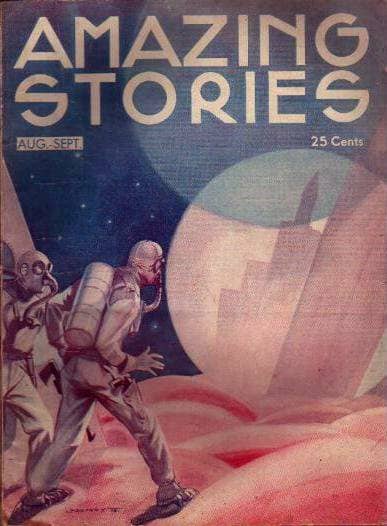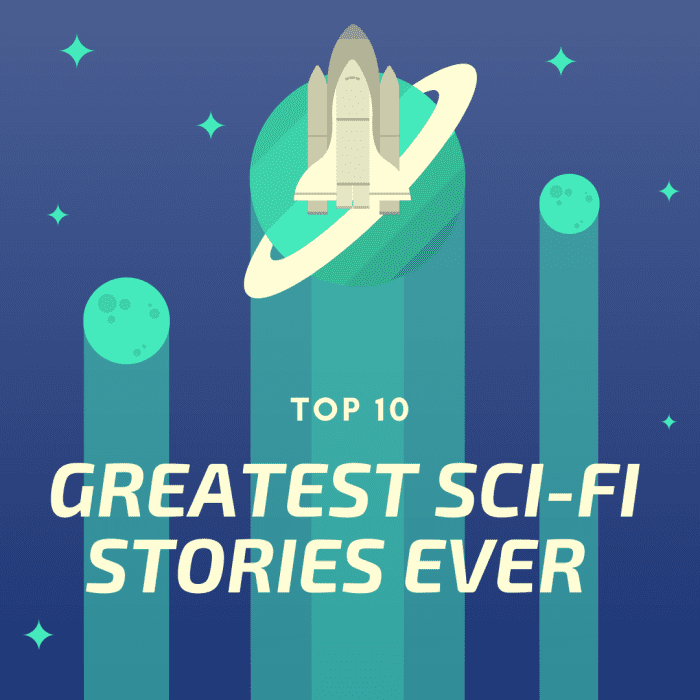10 Best Science Fiction Short Stories of All Time: From the Golden Age to the Modern Era
Best Science Fiction Stories of All Time
These are the best science fiction stories of all time, according to somebody who spent much of her life thinking that science fiction sucked. You see, it was only a few years ago that I admitted that I don't like modern science fiction short stories. I much prefer the fantastic science fiction shorts of the Golden Age that first appeared in science fiction short story pulp magazines in the 1920s, 1930s and 1940s, like Astounding Stories, Amazing Stories, Weird Tales, and the Magazine of Fantasy & Science Fiction.
To misquote the late Douglas Adams, "That's when stories were real stories. Plots were real plots. And small furry creatures from Alpha Centauri were vivid, exotic, fantastic and all too possible." As hokey as they may seem today, the old sci-fi short stories stand the test of time for good, solid fiction, if not for scientific accuracy.
When I compiled this reader's list of the best science fiction short stories of the 20th century (which is the same as "all time," as the genre became full-fledged only in the 1900s), I noticed I was markedly favoring stories published from the 1940s through the 1960s. I tried to like modern speculative fiction—I really did. And I will again when writers and publishers once again start turning out science fiction stories that actually give me the same sense of wonder as those old tales from the Golden Age did.

Amazing Stories magazine cover from August-September 1933 (during the Golden Age of science fiction).
Published by Teck Publications, Inc., Public Domain, via Wikipedia
Best Science Fiction Stories Ever
- Alfred Bester, "Fondly Fahrenheit"
- William Tenn, "Time in Advance"
- Connie Willis, "Daisy in the Sun"
- Lewis Padgett, "Time Locker"
- Isaac Asimov, "Nightfall"
- Anson MacDonald (Heinlein), "By His Bootstraps"
- Cordwainer Smith, "The Lady Who Sailed the Soul"
- Henry Bates, "Farewell to the Master"
- Murray Leinster, "Pipeline to Pluto"
- Daniel Keyes, "Flowers for Algernon"
How I Wrote This List
This might be obvious, but these are ten of the best science fiction stories ever, in my own opinion. It was anxiety-producing to narrow it down this much, as the body of work is so huge. They are in no particular order—except the first one. That one really is the best.
What you'll find: Short reviews of the stories and why I Iiked them.
What you won't find: Detailed plot summaries. What I personally like about top 10 lists is the reviewer's opinions. So that's what I've put here. Plot summaries can be found in the Wikipedia articles linked here.
How I Picked This List
Here are my criteria for this "best science fiction short stories" list. I based inclusion on whether or not many of these factors were to the story's credit:
- I read the story (with one exception).
- I loved the story.
- The story was fun to read. It wasn't depressing (with one exception).
- The story stayed with me—I thought about it for a long time, either in my nightmares or giggling about it spontaneously at work.
- The story was well-written. I was either not aware of any major writing flaws, or I got a shiver of delight at the way the words were written.
- The story gripped me, and didn't let go. I never thought, "I've got to go get my laundry out of the dryer," in the middle of it.
- The story made me feel a sense of wonder. Even decades after it was written, in the age of the iPad and Android and suchlike.
- The story is important. It did something new that changed the way science fiction was written afterward, or it changed society.

Alfred Bester's work in Galaxy
Galaxy Publishing/Ed Emshwiller, Public Domain, via Wikipedia
1. "Fondly Fahrenheit" by Alfred Bester
Alfred Bester won a 1953 Hugo Award for his novel The Demolished Man. Besides being a true personality and a novelist, he was a rare beast amongst Golden Age science fiction writers. He didn't just tell a great tale—he could write. Many Golden Age writers (including one of the best-known, Robert Heinlein) were far better storytellers than they were writers. They had vision, but words—not so much.
Bester wrote with a deep understanding of the psychology of language. He knew English well enough to play with it, mangle it, do impossible things with it. With "Fondly Fahrenheit," the writing doesn't just tell the story—it becomes the story. Which I suspect is why "Fondly Fahrenheit" was not ultimately dismissed as just another science fiction horror story.
Though the story's disturbing premise—that a servile android-robot could turn on its human superiors and commit murder—was probably radical at the time, without Bester's way with words, "Fondly Fahrenheit" wouldn't have become the classic science fiction short story that it is today. It's still cited as one of the best sci-fi stories ever.
"Fondly Fahrenheit" isn't "literary" or prosy like Ray Bradbury's "A Sound of Thunder." It's just beautifully written, with a suspenseful mystery and a catchy song you won't forget (but will want to). It's a story you have to keep reading. And the end . . . the end changes everything and makes it, in my book, the undisputed best science fiction short story of all time. (But feel free to dispute it if you like.)
Warning: As it is about a serial killer, "Fondly Fahrenheit" is a fairly dark story and may not be suitable for kids.

William Tenn's work in Fantastic Adventures
Ziff-Davis Publishing/Robert Fuqua, Public Domain, via Wikipedia
2. "Time in Advance" by William Tenn
(Note: Don't confuse the short story "Time in Advance" with the title of the volume of four stories that contains it, called Time in Advance.)
William Tenn is one of those science fiction writers who are well-known by dedicated fans and hardly known by casual readers. When asked to choose a favorite William Tenn science fiction short story, many would name "The Brooklyn Project." And "The Brooklyn Project" is almost a perfect short story—satirical and ironic, with cut-throat social commentary and deftly drawn archetypes.
But maybe because it's a linear, straight-shot fable-like morality tale, "The Brooklyn Project" is almost too perfect. I like character-driven stories, lighthearted humor and a twist that sneaks up on you, and science fiction author William Tenn delivered truly wicked humor and characterization in "Time in Advance."
"Time in Advance" is the story of a man who's about to commit a lethal crime—a crime for which he's already paid his debt to society. Far from being a dark story of a vicious criminal secretly planning a covert murder, Tenn's tale takes a light approach. In this world, society views the crime as perfectly legal, if something of a novelty. The hero is aiming to commit a vile crime, and not only is nobody about to stop him . . . his criminal intentions make him a celebrity. Cool concept, huh?
How many times have you read a story that starts off with a good idea, but has poor execution? This is not one of those times. "Time in Advance" has almost perfect execution. The "what if" in this case is "What if people paid for the crime of murder before they committed it, and the penury was so heinous that nobody ever survived to commit the crime ... until now?" Tenn takes this premise and develops its permutations with complete and utter mastery.
Tenn excels at twist endings—hilarious "aha" endings, such as in "The Brooklyn Project." "Time in Advance" not only has that, but it also has a "feel good" ending, something sorely lacking in science fiction today, as if a happy ending would signify the end of speculative fiction as we know it. Yes, the ending somewhat dulls the cutting edge of the social commentary. But it works. I consider "Time in Advance" truly one of the best science fiction stories of all time.
3. "Daisy, In the Sun" by Connie Willis
Connie Willis, speculative fiction novelist and author of tragic science fiction (Passage) and comic science fiction (To Say Nothing of the Dog), is one of the most popular modern science fiction authors writing today. A story she published back in 1979, "Daisy, In the Sun," appearing in the short story collection Fire Watch, is one of the few (ironically) dark stories I love. And though it's not from the Golden Age, it is a real card-carrying, sense-of-wonder-bringing "what if" story.


